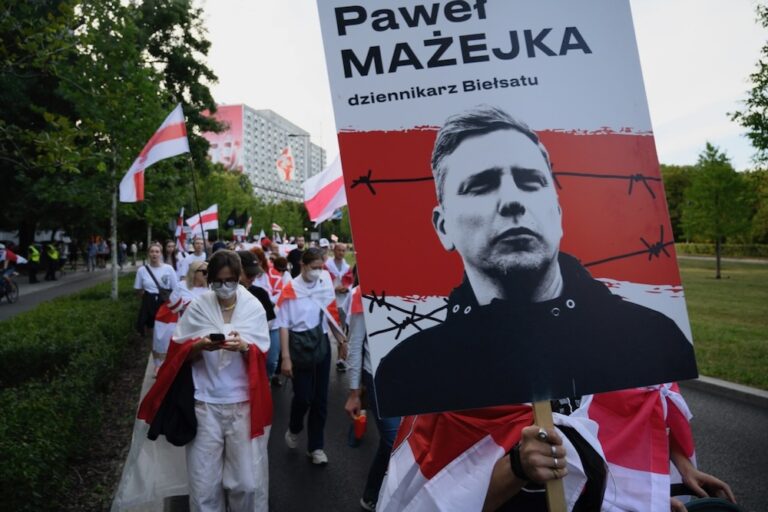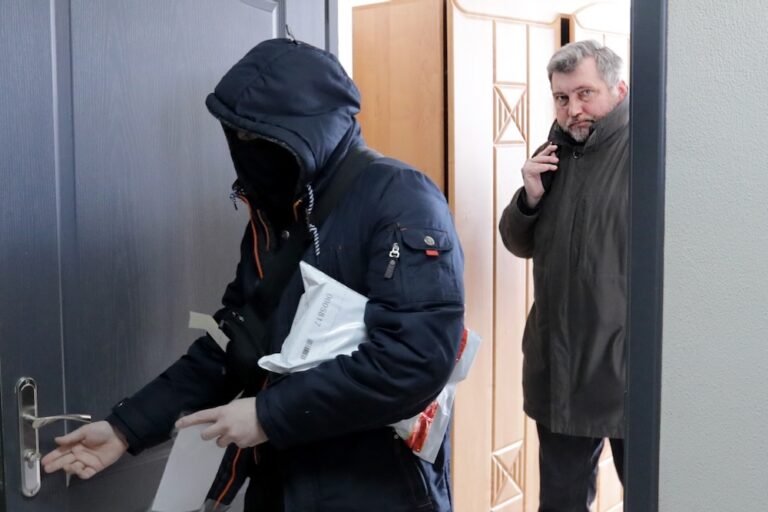(RSF/IFEX) – RSF has voiced alarm as working conditions plunged to a new low, with security forces arresting and beating journalists during elections and at opposition demonstrations. Some foreign television journalists also complained that they were prevented from sending their footage to viewers abroad. The organisation recalled that President Alexander Lukashenko is on its list […]
(RSF/IFEX) – RSF has voiced alarm as working conditions plunged to a new low, with security forces arresting and beating journalists during elections and at opposition demonstrations. Some foreign television journalists also complained that they were prevented from sending their footage to viewers abroad.
The organisation recalled that President Alexander Lukashenko is on its list of international “press freedom predators”.
Trouble broke out in central Minsk on the evening of 19 October 2004 as hundreds of opposition demonstrators rallied to condemn the results of legislative elections and a constitutional referendum that allows the president to run for a third consecutive term in office.
A cameraman with Russian NTV television, Konstantin Morozov, was assaulted by anti-riot police inside a building where security forces had taken opposition leader Anatoly Lebedko. The journalist was thrown to the ground and kicked repeatedly. His camera was destroyed and witnesses described seeing his face covered in blood. Vladimir Koscin, a cameraman with Russian REN TV, was also severely beaten.
Among about 50 people detained during the night was Associated Press (AP) photographer Sergeï Grits. He was immediately released after saying he was a journalist. “They told me that reporters were obstructing the work of the police and that I should have kept further back. I replied that if I had done that I would have been unable to take any photos,” he said.
Polish journalist Hanna Harasimowicz of “Informator Kulturalny” magazine was arrested on 16 October in Bykhau, eastern Belarus, while visiting a polling station. She said elections officials became extremely agitated when she asked them how many people had voted during the week. She was questioned for more than one hour about why she had such an interest in electoral procedures.
Several foreign television correspondents also said it had been impossible to broadcast their footage on 19 and 20 October.
A crew from Russian Perviy Kanal television said on 20 October that they had been unable to get out footage of a second day of opposition demonstrations. Belarus radio and television, which normally relays footage, claimed there had been a technical hitch. The Russo-Belarusian group Mir, which relays footage by satellite, also turned them down after 19 October demonstrations that were brutally put down.
Dmitry Novozhilov, a reporter with the Perviy Kanal crew, said, “It is impossible to send any footage from Minsk even without the elections and referendum. They always give the same excuse: technical problems.”
Elena Slav, a reporter for REN TV, said that since 19 October Mir staff have given “technical problems” as their excuse for not relaying footage to Moscow. “At 9:30 p.m. we were due to send footage of Anatoly Lebedko being beaten up, but we were told not to come to the studio because our film could be seized,” she said, adding that other television crews had encountered the same problem.


